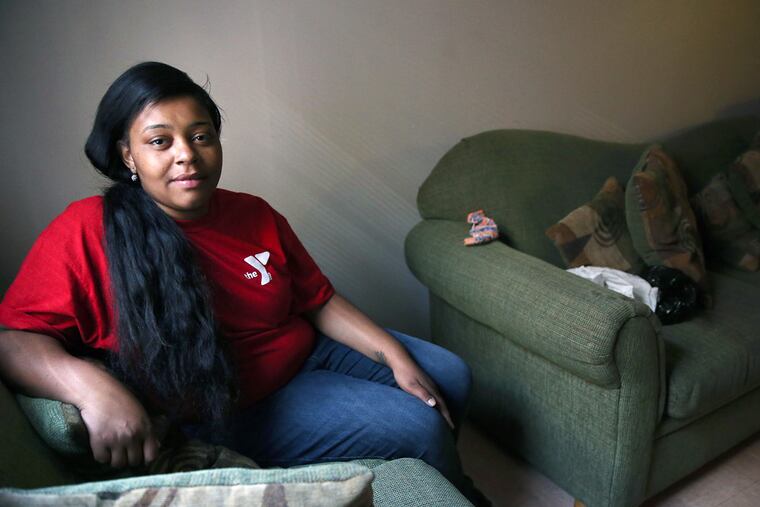Armstrong: It's way past time to raise the minimum wage
How do you get by on just $7.50 an hour? Safiyyah Cotton, a McDonalds cashier, does it by relying on government assistance. It shouldnt be this way.

Correction: Quotes attributed to Kati Sipp in the original version were actually from Kate Goodman, an organizer for 15Now.
Safiyyah Cotton earns a lousy $7.50 an hour working at a McDonald's in North Philadelphia.
Chump change.
Yeah, I know it's McDonald's. But it's not as if Cotton is some teenager still living at home with parents who pay for everything. She's a 22-year-old single mother taking care of both herself and her young son.
And get this: She usually only works about 20 hours a week. There have been times when she's shown up to work, only to be sent home by her supervisors who said they already had enough workers. As a result, a typical check for her is only about $230 to $240 every two weeks. That's nothing when you have to pay rent and utilities and also buy food.
If it weren't for government aid - she gets $216 in food stamps, and also child-care assistance and Section 8 housing - she'd be even worse off. To economize, Cotton buys frozen food instead of fresh produce and once opted to have a tooth pulled rather than get a root canal because it was cheaper. Until recently, it looked as if there was no way out for Cotton, who dreams of one day going back to school.
Then, she got involved with Fight for $15, a grass-roots effort to get the minimum wage increased for low-paid airport, child-care, gas-station, convenience-store and fast-food workers.
Last week, Cotton testified before an ad-hoc committee called the People's Wage Board, local activists involved in the fight for higher wages for low-income workers. The hearing was a chance for low-wage workers like Cotton to be heard. Although the board has no legal or governmental power, it was seen as a way to rally people to the cause of higher wages for low-paid workers.
Last month, New York became the first state to enact a $15 minimum wage for fast-food workers at chain restaurants. Gov. Andrew Cuomo did so by bypassing the state Legislature and having his labor commissioner appoint a state Wage Board, which recommended the increase. Minimum-wage activists were emboldened by that.
"We believe that with enough pressure, our governor, Gov. Wolf, will find a way to raise the minimum wage," said Kate Goodman, an organizer for 15Now.
Cotton was among about 15 low-wage earners who testified at Tuesday's hearing.
"I just told them who I was, that I had a son," she said last week after the hearing. "I would like to own my own home and send my son to college without loans and set him up with a savings account."
I learned about Cotton's situation last month after CNN profiled her and a link appeared on Facebook. Her saga stayed with me because of how common it is in a city as poor as Philadelphia. I see people in her position all the time, scraping by, earning peanuts.
The current minimum wage in Pennsylvania is $7.25 and needs to be hiked to at least $10.10 an hour, as President Obama has suggested doing on a federal level. It would save taxpayers an estimated $4.6 billion a year on federal food stamps, according to the Center for American Progress.
"People are in this cycle of poverty where they can't earn enough money to pay for college or they can't get a predictable schedule to be able to look for other jobs," said Goodman, who moderated the hearing. "They are just at the mercy of their bosses. Getting out of that situation is really difficult."
Cotton, a 2011 graduate of Benjamin Franklin High, had enrolled at Livingstone College in Salisbury, N.C., to study criminal justice. But after a visit home, she met up with her childhood boyfriend and wound up pregnant, which brought an end to her studies there.
Back home, she enrolled at Lincoln Technical Institute and became a certified medical assistant. When she didn't find work in that field, she had to do something. She wound up working as a cashier at McDonald's.
The CNN video profile shows her walking morosely through rain-soaked city streets with a gray hoodie covering her head. You see her trying to put her 1-year-old son, Safi, in his stroller and coaxing him to eat. She looks so alone. And she is, to some extent. Her son's father, whom she doesn't name, is incarcerated.
After the piece aired, offers for jobs and assistance flooded in. Cotton set up a GoFundMe account to collect the donations. As of last night, more than $11,000 had been sent her way.
She smartly used some of the money to pay off her rent through the end of the year, and also is using some to outfit her son's room with a truck bed so it will look like a little boy's room.
Cotton has opened checking and savings accounts, and plans to save the rest.
She plans to stay active in Fight for $15 and feels heartened by New York's action as well as growing support nationwide for higher wages.
Tomorrow, activists plan to rally at Temple University on Berks Street between 12th and 13th streets to demand a campuswide minimum wage of $15 an hour.
"I know it's going to change, sooner than later," Cotton, who has become a leader in this movement, told me yesterday. "It just takes time."
- The Associated Press contributed to this report.